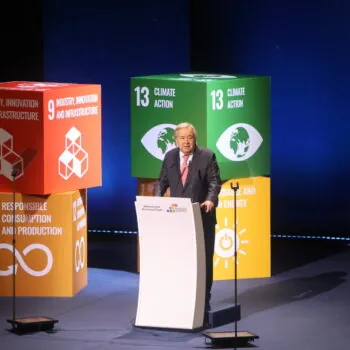We are in an era where climate change policies and commitments need to be translated into effective implementation on the ground. This is the time for delivery. In recent years Governments around the world have set up policies and targets to mitigate climate change and develop resilience. Just last week 175 countries signed the Paris Climate Change Agreement which includes their Nationally Determined Contributions (NDC), post-2020 GHG emission reduction actions and targets in the context of their national priorities and circumstances. But to make it real, climate finance needs to be strategically mobilised at an increasing pace and scale. But what will it take to build that process?
Since 2009, E3G has been working with a range of governments to build a systemic understanding of the financial challenges in different regions and help them to develop strategic responses to meet them. What we have learned is that achieving the necessary scale and pace of sustainable investment requires a strong and credible political commitment to build investor confidence in the long-term sustainability of policy frameworks, underpinned by a dynamic and coordinated policy and financing strategy. We call this approach “National Financing Strategies to meet climate and development goals” (NFS). The focus is on how international and national public finance can be deployed alongside policy initiatives to maximise the ‘crowding-in’ of private capital and to scale up investment to deliver climate-resilient development aims.
Our experience shows that the first step is to raise awareness of the crucial role of having an NFS for meeting climate change targets and the opportunities it brings to the real economy. This process entails bringing together a variety of key Government department with stakeholders from the private sector including developers from different key industries and the finance community ranging from public development and commercial banks, institutional investors and insurance sectors. It is critical to be able to ‘translate’ the needs and opportunities to the different audiences and have a Government champion who has the leadership and decision making power to engage other Government actors and prioritise the NFS.
As part of the process of building an NFS the following elements are needed:
- Understand the policy and financial landscape
- Understand the finance challenge, considering an economy wide approach
- Bring back the focus on the “big conversation” breaking silo dialogues and policies
- Ensure there’s a clear understanding of the dynamic process of building an NFS
- Understand the country context, reform agendas, politics and policy dynamics
Understanding and mapping where capital sits within the finance system as well as the risk appetite and return on investment needed by the institutions that deploy that capital is key to understanding how to develop an effective NFS.
Moving forward it is important to establish a governance framework in which decisions are made as the NFS develops, focusing initially on three questions:
- What needs to be financed?
- Who will finance it (the roles of public and private, national and international actors)?
- How will it be financed (the roles of policies and institutions)?
Keeping stakeholders engaged in the process and advancing on the NFS requires having propositions around these areas, which can include priority areas to focus where finance is not flowing at the pace and scale needed, for example small scale renewable energy and energy efficiency. Other priority areas can include sectors where the market is less developed like sustainable transport (which requires help in most countries), sustainable infrastructure and aggregation vehicles to mobilise finance at scale.
The process of defining ‘who’ will finance the NFS can help discover technical capacity gaps in structuring financeable and bankable projects and identify project pipelines linked to the country’s climate change goals. Through an ongoing dialogue on “how” it will be financed the NFS can lead to the creation of new institutions, adapt the role of existing ones and/or target efficient use of resources that will result in high leverage rates of private capital flowing to the areas needed the most. The NFS will ultimately result in increased ambition towards climate change goals, securing the delivery of commitments and other co-benefits in the real economy.


